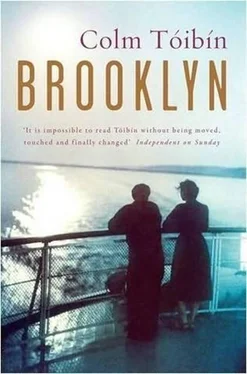On the Sunday, as she packed her cases and left them by the bed, finding that she had acquired more belongings than she could fit into them and having to go downstairs and quietly ask Mrs. Kehoe for some carrier bags, she felt that Mrs. Kehoe had taken advantage of her, and she found herself suffering the beginnings of the terrible homesickness she had gone through before. That night, she did not sleep.
In the morning there was a biting wind that was new to her. It seemed to blow fiercely in every direction; it carried ice with it and people moved in the streets with their heads bowed, some of them dancing up and down with the cold as they waited to cross the street. It made her almost smile at the idea that no one in Ireland knew that America was the coldest place on earth and its people on a cold morning like this the most deeply miserable. They would not believe it if she put it in a letter. All day in Bartocci's people roared at anyone who left the door open for a second longer than necessary and there was a brisk trade in heavy woollen underwear, even more than usual.
That evening as she took notes during the lectures Eilis was struggling so hard to stay awake that she put no thought into what she would find when she returned to Mrs. Kehoe's and, when walking home from the trolley-car, decided she did not care what her new room was like as long as it was warm and had a bed where she could sleep. The night was still, the wind having died down, and there was a dryness and a punishing intensity in how the icy air bit into her toes and fingers and hurt the skin on her face and made her pray that this journey by foot would end even when she knew that she was only halfway there.
As soon as she had opened the front door Mrs. Kehoe appeared in the hallway and put her fingers to her lips. She motioned for Eilis to wait, returned a moment later and, having checked that no one was coming into the hallway from the kitchen, handed Eilis a key; she then directed her back out into the night, closing the front door softly behind her. Eilis walked down the steps to the basement. By the time she had opened the door Mrs. Kehoe was already waiting for her.
"Don't make a sound," she whispered.
She opened the door that led into the front room of the basement, the room recently vacated by Miss Keegan. A standard lamp in the corner and a lamp by a bedside table were already lit, and these, with the low ceiling and the dark velvet curtains and the richly patterned bedspread and the rugs on the floor, made the room seem luxurious, like something from a painting or an old photograph. Eilis noticed a rocking chair in the corner and saw that there were logs in the fireplace and paper under them waiting to be lit. The room was twice the size of her old bedroom; it also had a desk where she could study and an easy chair on the other side of the hearth to the rocking chair. It had none of the functional, almost Spartan aura of the room she had slept in until now. She knew that all of her fellow lodgers would have wanted this room.
"If any of them ask you, just say that your own room is being decorated," Mrs. Kehoe said as she opened a large built-in closet whose wood was stained a dark reddish colour, to show Eilis where the suitcases and bags were. Because of the way Mrs. Kehoe stood watching her, her gaze proud but almost soft and sad as well, it struck Eilis that this room might have been created in the time before Mr. Kehoe left home. As she looked at the double bed she wondered if this had been their bedroom. She wondered if they had rented out the rooms on the upper floors.
"The bathroom is at the end of the corridor," Mrs. Kehoe said. She stood in the shadowy room uneasily, as though she were trying to regain her composure.
"And say nothing to anyone," she added. "You can never go wrong if you follow that policy to the letter."
"The room is lovely," Eilis said.
"And you can light a fire," Mrs. Kehoe said. "But Miss Keegan only ever did on Sundays because it eats wood. I don't know why."
"Will the others not be raging?" Eilis asked.
"It's my house so they can rage all they like, the more the merrier."
"But-"
"You are the only one of them with any manners."
Mrs. Kehoe's tone, as she tried to smile, caused, Eilis felt, a sadness to come into the room. She believed that Mrs. Kehoe was giving her too much without knowing her well enough and just now had also said too much. She did not want Mrs. Kehoe to become close to her or come to depend on her in any way. Eilis left silence for a few moments, even though she knew that this might make her seem ungrateful. She nodded almost formally at Mrs. Kehoe.
"When will the others know that I am here for good?" she asked eventually.
"In their own good time. It's none of their business anyway."
As she took in the implications of what Mrs. Kehoe had done and the trouble it was now likely to cause her with her fellow lodgers, Eilis wished she had been left alone in her old bedroom.
"I hope they won't blame me."
"Pay no attention to any of them. I don't think either of us needs to lose a night's sleep over them."
Eilis stood up straight, attempting to make herself taller, and stared coldly at Mrs. Kehoe. It was clear to her that her landlady's last remark carried with it the firm idea that she and Eilis stood apart from the other lodgers and were prepared to intimate to them that they had conspired in this. Eilis believed that this was a piece of gross presumption on Mrs. Kehoe's part but also that the decision to give her, the most recently arrived, the best room in the house not only would cause bitterness and difficulty between herself and Patty, Diana, Miss McAdam and Sheila Heffernan but would come to mean, in time, that Mrs. Kehoe herself would feel free to call in the favour she had done her.
She could, Eilis saw, do this if she needed something urgently, or allow it to cause a familiarity in their relationship, a sort of friendship or close connection. As they stood in the room, Eilis felt almost angry with Mrs. Kehoe, and this feeling, mixed with tiredness, seemed to give her courage.
"It's always better to be honest," she said, imitating Rose when Rose found her dignity or sense of propriety challenged in any way. "I mean with everybody," she added.
"When you've gone through the world like I have," Mrs. Kehoe replied, "you'll find that that only works some of the time."
Eilis looked at her landlady, not flinching at the wounded aggression in the way her look was returned. She was determined not to speak again, no matter what Mrs. Kehoe said. She felt the older woman's irritation directed against her as though she had betrayed her in some incalculable way, until she realized that giving her this room, the act of generosity, had released something in Mrs. Kehoe, some deep resentment against the world, that Mrs. Kehoe was now putting carefully back in its place.
"The bathroom as I said is down the corridor," she finally said. "And I'm leaving the key here."
She put the key on a side table and left the room, banging the door so that the whole house would hear her.
Eilis wondered if the others would ever believe her if she told them that she had not asked for the room. She avoided the kitchen at breakfast-time and, on meeting Diana at the bathroom door on the second morning, rushed by her without saying a word. She knew, however, that when the weekend came it would be impossible to avoid a discussion with the others. Thus on the Friday evening, when Mrs. Kehoe had left the kitchen, and Miss McAdam said that she would like to speak to her alone, Eilis was not surprised. Under Miss McAdam's watchful gaze, as though she were a prisoner on parole who might try to abscond, she lingered in the kitchen after all the others had gone.
"I suppose you heard what happened," Miss McAdam said to her.
Читать дальше












